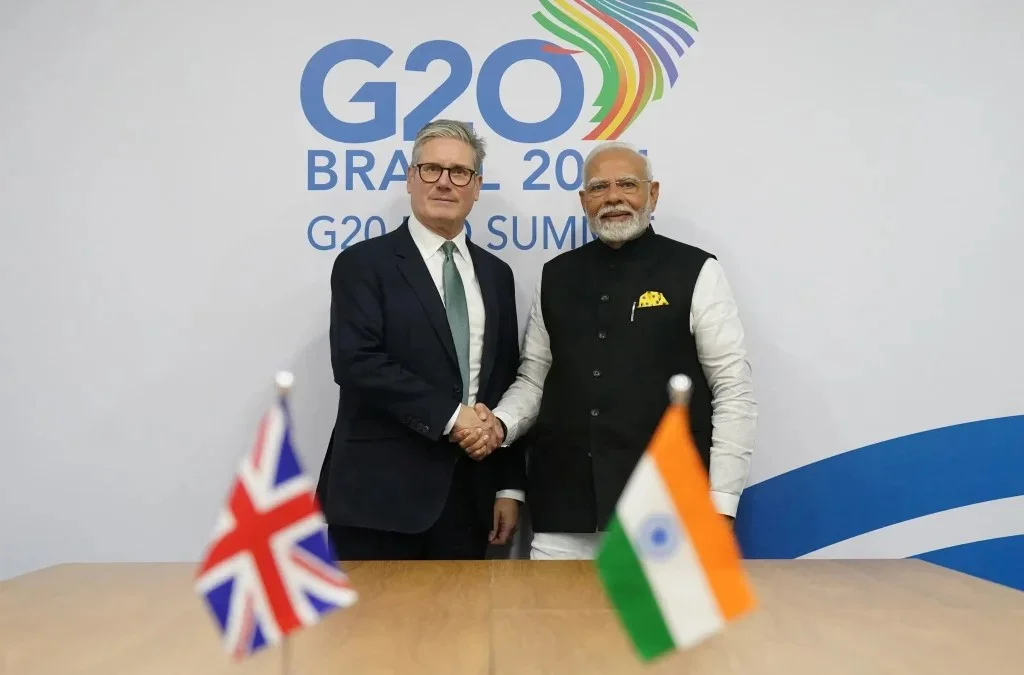The UK-India trade partnership is entering a new era as Prime Minister Keir Starmer and his Indian counterpart Narendra Modi unveiled a wave of new investments and collaborations aimed at transforming bilateral trade. Starmer’s two-day visit to Mumbai, accompanied by over 100 British business leaders, is part of efforts to fast-track the July trade deal and position both countries for long-term economic growth.
Revamped Trade Deal Targets £25.5 Billion Growth
Under the revised trade agreement, tariffs on textiles, whisky, and automobiles will be reduced, making it easier for both markets to access each other’s industries. The initiative aims to drive £25.5 billion in additional trade by 2040, cementing economic links between two of the world’s largest economies.
Modi and Starmer Emphasize Partnership Strength
Speaking during the meeting, Modi praised the partnership’s growing strength, calling it “a combination of India’s energy and the UK’s expertise.” His remarks reflected the optimism surrounding the collaboration’s ability to generate innovation and prosperity across both nations. Starmer, in response, noted that the partnership represents “shared ambition and global responsibility,” emphasizing the trust built between both governments.
Indian Firms Commit £1.3 Billion to the UK
A highlight of the visit was the announcement that 64 Indian firms will collectively invest £1.3 billion in the United Kingdom. The funds are expected to create hundreds of high-value jobs while boosting investment in emerging technologies. British officials said the deals will strengthen cooperation in AI, renewable energy, digital infrastructure, and other fast-growing sectors that are shaping the future economy.
Expanding Cooperation in Defense and Technology
The two nations also advanced their defense and technology partnerships. Agreements include a £350 million contract for UK-produced missiles to support India’s defense forces, a £250 million naval engine collaboration aimed at improving maritime capabilities, and a new AI and Connectivity Innovation Centre, along with a Critical Minerals Guild, to promote sustainable technology. In addition, both countries will fund projects on climate technology, medical research, and offshore wind energy to accelerate the green transition.
Navigating Political and Strategic Differences
Despite occasional diplomatic differences—such as India’s outreach to Russia—Starmer’s approach remained cordial, reaffirming Britain’s support for Ukraine while maintaining constructive ties with New Delhi. UK Secretary Douglas Alexander said that political disagreements “do not weaken the core of the economic relationship,” stressing the partnership’s strategic importance in an uncertain global economy.
Education Becomes a Bridge for Growth
Education is also part of the renewed cooperation. Two British universities will launch campuses in India, extending academic opportunities without driving migration. The initiative supports the UK’s updated visa policy, which now focuses on targeted collaboration rather than volume, ensuring continued educational influence while managing migration numbers.
A Future-Oriented Partnership
The strengthened UK-India trade partnership signals a shared commitment to innovation, sustainable growth, and mutual progress. With the agreement set to take effect within a year, both governments aim to use it as a springboard for economic expansion through 2040 and beyond. Starmer’s trip, his first as prime minister to India, underlines the importance of a modernized partnership that not only enhances trade but also builds a framework for technological and geopolitical collaboration in the decades ahead.
__________________________________________________






